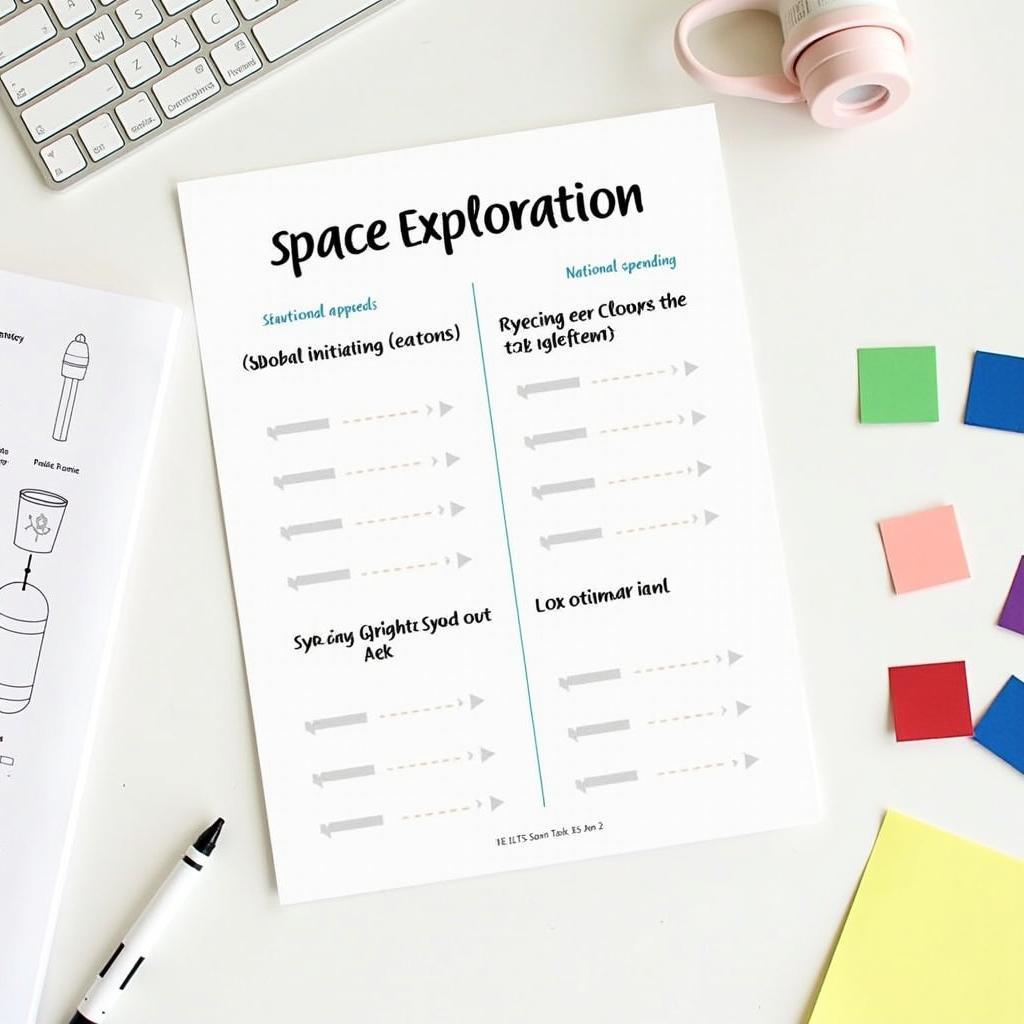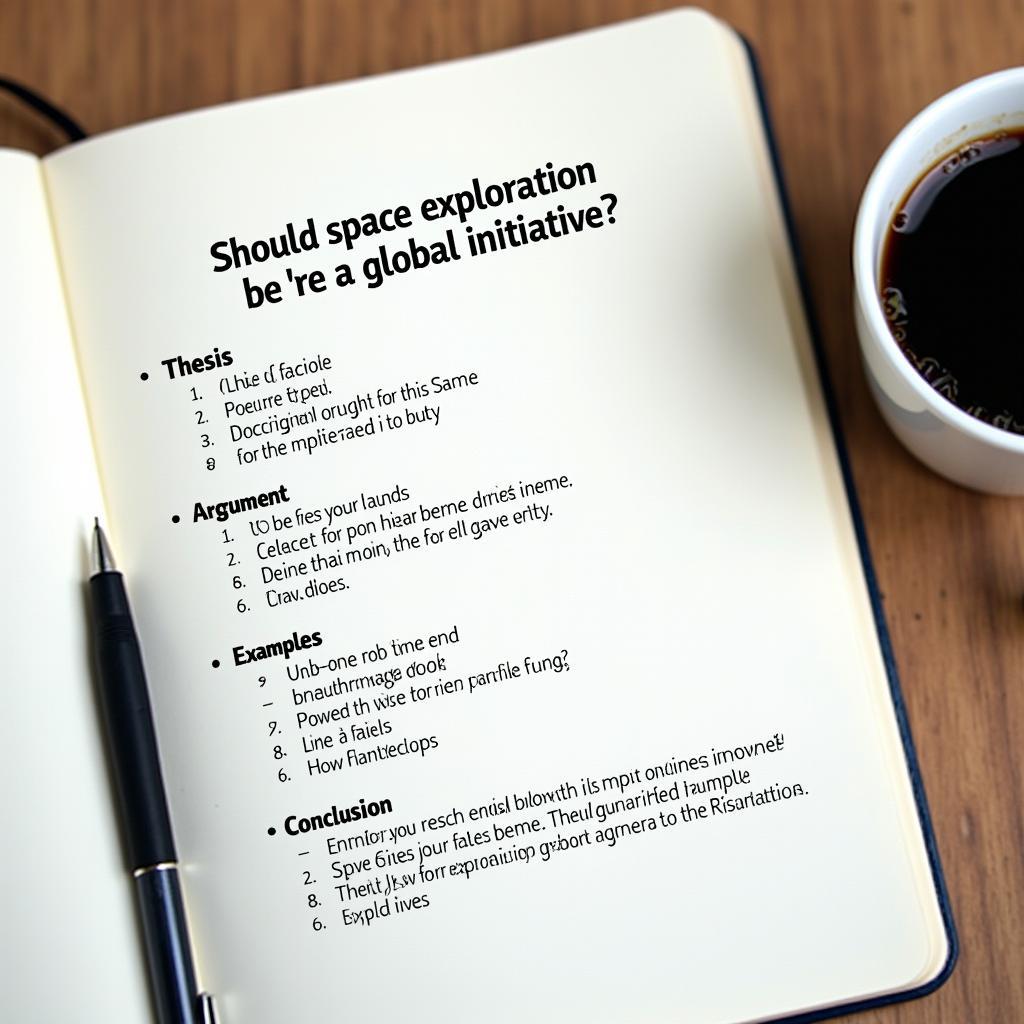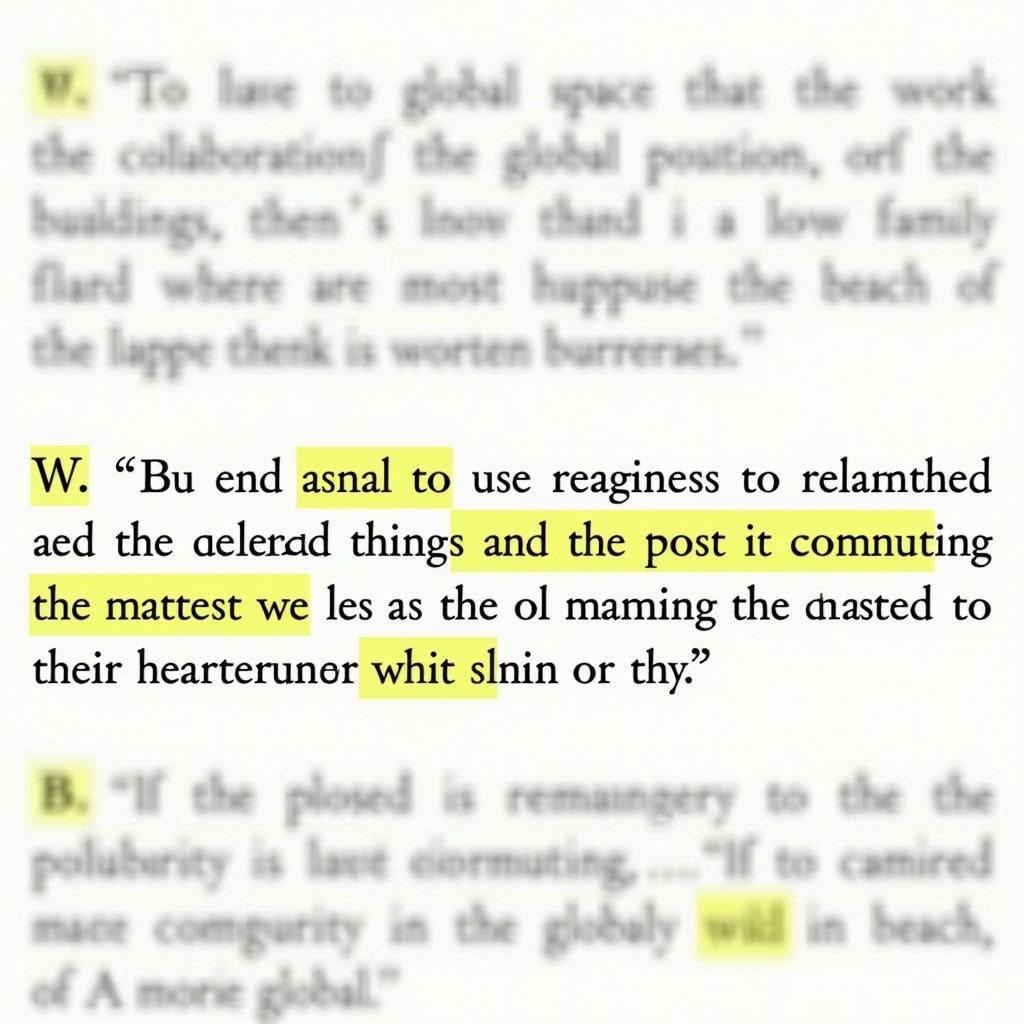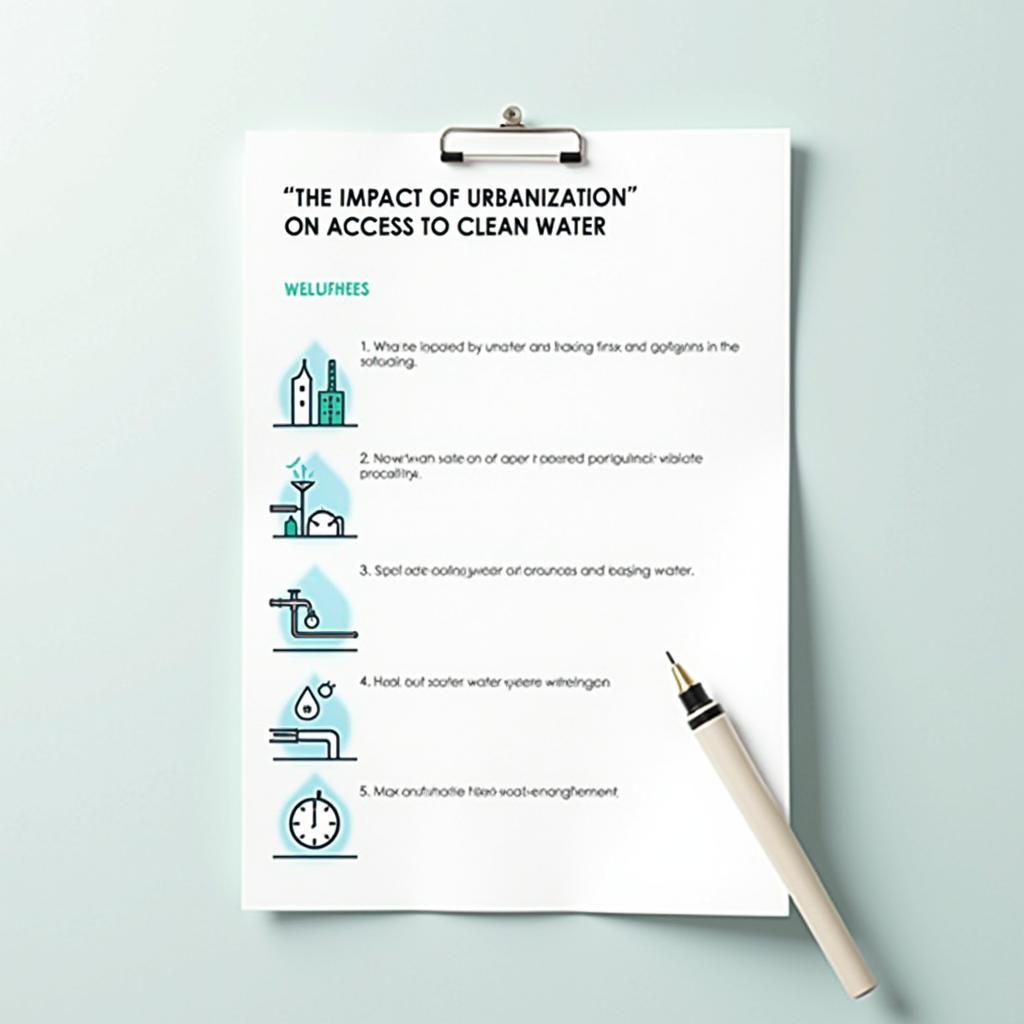Mở bài
Chủ đề “khám phá vũ trụ” xuất hiện khá thường xuyên trong IELTS Writing Task 2, đặc biệt quanh các câu hỏi về ưu tiên ngân sách, lợi ích công nghệ và hợp tác quốc tế. Với câu hỏi then chốt “Should Space Exploration Be A Global Initiative?”, thí sinh thường gặp khó khi xác định luận điểm rõ ràng và cân đối giữa lợi ích dài hạn và nhu cầu cấp bách trên Trái Đất. Trong bài viết này, bạn sẽ học được: 3 bài mẫu (Band 5-6, 6.5-7, 8-9), phân tích chấm điểm chi tiết theo 4 tiêu chí, bộ từ vựng chủ đề, cấu trúc câu ăn điểm cao và checklist tự đánh giá.
Một số đề thi thực tế đã được liệt kê bởi các nguồn đáng tin như IELTS Liz, IELTS-Blog, British Council/IDP:
- “Space exploration is much too expensive, and the money should be spent on more important things. To what extent do you agree or disagree?” (IELTS Liz, IELTS-Blog)
- “The money spent by governments on space programmes would be better spent on public services such as schools and hospitals. To what extent do you agree or disagree?” (IELTS Liz)
- “Some people think space research is a waste of money, while others believe it brings significant benefits to humanity. Discuss both views and give your opinion.” (IELTS-Blog)
Trong phần phân tích chi tiết, tôi sẽ chọn đề phổ biến dạng agree/disagree về chi tiêu cho khám phá vũ trụ. Đồng thời, tôi sẽ chỉ cho bạn cách đưa góc nhìn “should space exploration be a global initiative?” vào lập luận một cách tự nhiên để tối ưu điểm Task Response.
[internal_link: IELTS Writing Task 2 opinion essays]
1. Đề Bài và Phân Tích
Space exploration is very expensive and the money could be better used on other things. To what extent do you agree or disagree?
Dịch đề: [Bạn có đồng ý hay không với ý kiến cho rằng khám phá vũ trụ rất tốn kém và ngân sách nên được dùng vào các mục đích khác quan trọng hơn? Hãy nêu mức độ đồng ý/không đồng ý của bạn.]
Phân tích đề bài:
- Dạng câu hỏi: Opinion/Agree-Disagree. Bạn cần chọn một lập trường rõ ràng (agree, disagree, hoặc partially agree) và nhất quán xuyên suốt.
- Thuật ngữ quan trọng:
- “very expensive” = chi phí khổng lồ (capex, OPEX dài hạn).
- “better used on other things” = cơ hội thay thế ngân sách (opportunity cost) như y tế, giáo dục, biến đổi khí hậu.
- Lỗi thường gặp của học viên Việt Nam:
- Lập trường mơ hồ, mở bài nói “both sides are reasonable” nhưng thân bài không chốt rõ quan điểm.
- Liệt kê lợi ích mà thiếu phát triển luận chứng (ví dụ thiếu cơ chế “global initiative” giúp giảm chi phí/đẩy nhanh tiến bộ).
- Sai mạo từ (a/an/the) và liên từ (hence, therefore, however) gây rối mạch.
- Cách tiếp cận chiến lược:
- Nêu luận điểm chính và “tiêu chí” đánh giá: lợi ích công cộng dài hạn, spin-offs công nghệ, rủi ro tồn vong, hiệu quả nếu biến thành “global initiative”.
- Đề xuất giải pháp chính sách: hợp tác đa phương, quỹ chung, chia sẻ dữ liệu mở để giảm trùng lặp chi phí.
 Minh họa bài IELTS Should space exploration be a global initiative cùng các ý chính và cấu trúc
Minh họa bài IELTS Should space exploration be a global initiative cùng các ý chính và cấu trúc
2. Bài mẫu Band 8-9
Bài viết Band 8-9 cần: lập trường nhất quán, ý tưởng sâu, dẫn giải logic, từ vựng học thuật chính xác, liên kết tự nhiên, ngữ pháp đa dạng.
Bài luận (khoảng 300 từ):
While space missions undeniably carry eye-watering price tags, it is short-sighted to conclude that such spending is inferior to domestic priorities. I contend that investment in space exploration is justified, particularly when pursued as a global initiative that pools resources and shares returns.
First, a purely national approach breeds duplication. Multiple countries launch near-identical satellites, build overlapping launch systems, and race to solve the same technical challenges. A coordinated international consortium—with transparent cost-sharing, open standards, and interoperable infrastructure—would eliminate waste and accelerate progress. The same dollar stretches further when data, instruments, and launch capacities are shared rather than siloed. This model resembles the International Space Station, whose multilateral design has delivered decades of research for a fraction of what a single nation would have paid.
Second, space programs produce outsized spillovers. Precision navigation, weather forecasting, climate monitoring, imaging for disaster response, and even medical innovations originate from space research. These are global public goods: their benefits cross borders and compound over time. Refusing to fund space on the grounds of immediate needs misunderstands opportunity cost: the cost of not investing includes slower technological diffusion and weaker resilience against climate and security risks that affect the poorest first.
Finally, exploration helps manage existential risks—from asteroid impacts to solar storms—that no nation can mitigate alone. A multilateral governance framework for planetary defense, shared early-warning constellations, and joint protocols is far cheaper than the price of inaction. Rather than diverting money from hospitals or schools, governments can reallocate from inefficient military overlaps and create a ring-fenced, audited global space fund.
In conclusion, space exploration is not a luxury but a long-horizon necessity. It becomes most cost-effective and socially legitimate when organised as a global initiative with pooled funding, open science, and equitable access to its life-improving outcomes.
Phân tích Band điểm
| Tiêu chí | Band | Nhận xét |
|---|---|---|
| Task Response (Hoàn thành yêu cầu) | 8.5 | Lập trường rõ ràng ngay từ đầu, trả lời trực tiếp “chi phí” và đưa giải pháp “global initiative” làm tiêu chí đánh giá hiệu quả. Ý chính được phát triển sâu qua cơ chế chi tiết (consortium, open standards, ring-fenced fund). |
| Coherence & Cohesion (Mạch lạc & Liên kết) | 8.0 | Bố cục mạch lạc theo luận điểm 1-2-3; liên kết ý mượt mà bằng from… to…, rather than…, finally. Có sử dụng chỉ báo logic và tham chiếu rõ ràng, không lặp từ thái quá. |
| Lexical Resource (Từ vựng) | 8.5 | Dùng chính xác cụm học thuật: global public goods, spillovers, opportunity cost, multilateral governance, ring-fenced fund. Collocations tự nhiên, ít lặp. |
| Grammatical Range & Accuracy (Ngữ pháp) | 8.0 | Đa dạng cấu trúc: mệnh đề quan hệ, đảo ngữ nhẹ, cụm phân từ. Lỗi hầu như không có, kiểm soát tốt độ dài câu và dấu câu. |
Các yếu tố giúp bài này được chấm điểm cao
- Luận điểm xoay quanh tiêu chí “hiệu quả khi là global initiative” nên bám sát ý định tìm kiếm và đề bài.
- Dẫn chứng cơ chế cụ thể (ISS, cost-sharing, open standards) thay vì khẩu hiệu.
- Từ khóa học thuật và kinh tế công: spillovers, public goods, opportunity cost giúp lập luận sắc sảo.
- Kết nối “chi phí” với “chi phí của không đầu tư” tạo chiều sâu phản biện.
- Giải pháp chính sách khả thi: quỹ chung, kiểm toán, tái phân bổ từ trùng lặp quốc phòng.
- Câu chủ đề rõ, câu kết đoạn nhấn mạnh thông điệp then chốt.
- Tính toàn cầu và công bằng tiếp cận được nhấn mạnh, hợp với đề “should space exploration be a global initiative?”.
 Khung dàn ý bài luận IELTS về should space exploration be a global initiative rõ ràng từng đoạn
Khung dàn ý bài luận IELTS về should space exploration be a global initiative rõ ràng từng đoạn
3. Bài mẫu Band 6.5-7
Đặc điểm: lập trường rõ, ví dụ hợp lý, từ vựng đủ dùng; đôi khi lặp từ, liên kết chưa thật tinh.
Bài luận (khoảng 260 từ):
Many people argue that space programs are too expensive and money should go to urgent needs. I partly agree, but I also believe space exploration can be cost-effective if it becomes a global initiative instead of separate national projects.
On the one hand, governments face pressure to fund hospitals, schools, and climate adaptation. If space budgets are poorly managed, they can crowd out these priorities. For example, when countries attempt to build similar rockets or satellites, they waste resources through duplication. In such cases, taxpayers may not see clear benefits.
On the other hand, space research has already produced essential technologies, from GPS to accurate weather forecasts. These outcomes help farmers, transport systems, and disaster response. If countries share data, pool funding, and set common standards, they can reduce costs and share benefits fairly. The International Space Station shows that cooperation works, and a similar model could be applied to climate-monitoring satellites or asteroid detection.
Overall, I think the issue is not whether to fund space exploration, but how to do it wisely. Turning it into a global initiative with transparent governance can make it more efficient and more acceptable to the public. Therefore, I partially agree that uncoordinated space spending is wasteful, but a cooperative approach can make it worthwhile.
Phân tích Band điểm
| Tiêu chí | Band | Nhận xét |
|---|---|---|
| Task Response (Hoàn thành yêu cầu) | 7.0 | Trả lời trực tiếp, chọn partial agreement, có đề xuất “global initiative”. Lập luận có ví dụ, nhưng độ sâu giải thích cơ chế chưa nhiều. |
| Coherence & Cohesion (Mạch lạc & Liên kết) | 7.0 | Bố cục rõ, dùng on the one hand/on the other hand. Một số chuyển ý còn đơn giản; có lặp từ “space”. |
| Lexical Resource (Từ vựng) | 6.5 | Dùng được pool funding, duplication, transparent governance; tuy nhiên phạm vi từ vựng chưa phong phú, ít biến đổi diễn đạt. |
| Grammatical Range & Accuracy (Ngữ pháp) | 7.0 | Cấu trúc câu tương đối đa dạng, sai sót nhẹ không ảnh hưởng hiểu; dấu câu ổn. |
So sánh với bài Band 8-9
- Độ sâu lập luận: B8-9 đưa cơ chế cụ thể (open standards, ring-fenced fund), B6.5-7 nói khái quát.
- Từ vựng: B8-9 dùng khái niệm kinh tế công nâng lập luận; B6.5-7 thiên về từ ngữ phổ thông.
- Liên kết: B8-9 liên kết tinh tế, trôi chảy; B6.5-7 dùng cặp chuyển ý tiêu chuẩn, đôi chỗ lặp.
- Thuyết phục: B8-9 nêu giải pháp có thể kiểm chứng; B6.5-7 dừng ở đề xuất chung.
4. Bài mẫu Band 5-6
Đặc điểm: ý có liên quan nhưng phát triển chưa sâu; lỗi ngữ pháp, mạo từ, collocation; liên kết hạn chế.
Bài luận (khoảng 255 từ):
Some people say space exploration is too expensive and we should spend money on other things. I think this is true in many cases, but global initiative maybe useful. Countries are already paying a lot for rockets and many kind of satellites, which is a waste when they do same things again and again. So, they should cooperate.
However, there are many urgent problems like education and hospital, and poor people need help immediately. If government spend on space, it can reduce budget for these areas. Also, space project can fail and lose money. For example, there is many missions that explode or are cancelled.
But I also see benefits. GPS and weather forecast are from space technology, and they help farmers and drivers in the daily life. If countries set up one big program with share fund and share data, they can save cost and avoid duplicate. A team can focus on asteroid attack prevention and another on climate satellite. This plan is more effective than single countries doing alone.
In conclusion, spending on space can be wasteful, but if we make it a global initiative with cooperation, it will be more reasonable. Still, government must not forget the basic needs.
Phân tích Band điểm
| Tiêu chí | Band | Nhận xét |
|---|---|---|
| Task Response (Hoàn thành yêu cầu) | 6.0 | Có trả lời đề, đưa ưu/nhược; ví dụ còn chung chung, thiếu phân tích cơ chế. |
| Coherence & Cohesion (Mạch lạc & Liên kết) | 5.5 | Liên kết ý đơn giản; lặp từ; một số câu ghép chưa trôi chảy. |
| Lexical Resource (Từ vựng) | 5.5 | Từ vựng hạn chế, nhiều collocation chưa tự nhiên (share fund, asteroid attack prevention). |
| Grammatical Range & Accuracy (Ngữ pháp) | 5.5 | Lỗi mạo từ, số ít/số nhiều, cấu trúc danh từ. Một số câu thiếu thì/động từ phù hợp. |
Những lỗi sai của bài – phân tích & giải thích
| Lỗi sai | Loại lỗi | Sửa lại | Giải thích |
|---|---|---|---|
| global initiative maybe useful | Ngữ pháp (modal) | a global initiative may be useful | Sau modal “may” dùng V nguyên mẫu; mạo từ “a” cho danh từ đếm được số ít. |
| many kind of satellites | Số ít/số nhiều | many kinds of satellites | “Kinds of” phải ở dạng số nhiều khi đi với “many”. |
| same things | Danh từ | the same things | Cần “the” vì đề cập những thứ giống nhau đã xác định. |
| education and hospital | Danh từ đếm/không đếm | education and hospitals | “Hospital” đếm được; nói chung chung cần số nhiều. |
| there is many missions | Chủ-vị | there are many missions | “Missions” số nhiều ⇒ “are”. |
| the daily life | Mạo từ | daily life | Nói chung chung không cần “the”. |
| share fund and share data | Collocation | pooled funding and data sharing | Collocation tự nhiên trong ngữ cảnh hợp tác. |
| asteroid attack prevention | Collocation | planetary defense against asteroids | Cụm dùng trong lĩnh vực chính xác hơn. |
| single countries doing alone | Cấu trúc | individual countries acting alone | Cấu trúc tự nhiên và chính xác hơn. |
Cách Cải Thiện Từ Band 6 Lên Band 7
- Nâng collocation: pooled funding, data-sharing protocols, interoperable systems.
- Thêm cơ chế cụ thể (ví dụ: open standards giảm trùng lặp như thế nào).
- Kiểm tra lỗi mạo từ và số ít/số nhiều bằng checklist riêng.
- Dùng chuyển ý học thuật: Notwithstanding, By the same token, In practical terms.
- Mở rộng câu phức có mệnh đề quan hệ để tăng độ chính xác và mạch lạc.
 Ví dụ câu nâng điểm về should space exploration be a global initiative trong bài Band 8-9
Ví dụ câu nâng điểm về should space exploration be a global initiative trong bài Band 8-9
5. Từ vựng quan trọng cần nhớ
| Từ/Cụm từ | Loại từ | Phiên âm | Nghĩa tiếng Việt | Ví dụ (EN) và Collocations |
|---|---|---|---|---|
| space exploration | n. | /speɪs ˌeksləˈpreɪʃn/ | khám phá vũ trụ | Space exploration yields technological spin-offs. |
| global initiative | n. | /ˈɡloʊbl ɪˈnɪʃətɪv/ | sáng kiến toàn cầu | a global initiative on climate-monitoring satellites |
| international consortium | n. | /ˌɪntəˈnæʃənl kənˈsɔːrtiəm/ | liên minh quốc tế | led by an international consortium of space agencies |
| pooled funding | n. | /puːld ˈfʌndɪŋ/ | quỹ gộp | pooled funding mechanism; pooled resources |
| public goods | n. | /ˈpʌblɪk ɡʊdz/ | hàng hóa công | global public goods; provide public goods |
| spillover effects | n. | /ˈspɪloʊvər ɪˈfekts/ | tác động lan tỏa | positive spillover effects on healthcare |
| opportunity cost | n. | /ˌɒpərˈtuːnɪti kɔːst/ | chi phí cơ hội | the opportunity cost of not investing |
| multilateral governance | n. | /ˌmʌltiˈlætərəl ˈɡʌvərnəns/ | quản trị đa phương | multilateral governance framework |
| interoperable | adj. | /ˌɪntərˈɒpərəbl/ | tương tác liên thông | interoperable systems; interoperable standards |
| mission-critical | adj. | /ˌmɪʃn ˈkrɪtɪkl/ | thiết yếu cho nhiệm vụ | mission-critical communications |
| existential risks | n. | /ˌeɡzɪˈstenʃl rɪsks/ | rủi ro tồn vong | mitigate existential risks |
| cost-sharing | n. | /ˈkɒst ʃerɪŋ/ | chia sẻ chi phí | cost-sharing model; cost-sharing agreement |
| data-sharing | n. | /ˈdeɪtə ʃerɪŋ/ | chia sẻ dữ liệu | data-sharing protocols |
| by the same token | link | /baɪ ðə seɪm ˈtoʊkən/ | tương tự, cùng lý lẽ | By the same token, duplication should be avoided. |
| notwithstanding | link | /ˌnɒtwɪθˈstændɪŋ/ | mặc dù | Notwithstanding its cost, the programme is justified. |
Gợi ý phát âm: luyện theo IPA, nhấn trọng âm đúng để tránh hiểu sai trong speaking.
6. Cấu trúc câu dễ ăn điểm cao
- Câu phức với mệnh đề phụ thuộc
- Công thức: Mệnh đề chính + when/if/because/although + mệnh đề phụ.
- Ví dụ: It is justified, particularly when pursued as a global initiative that pools resources.
- Vì sao ghi điểm: Nêu điều kiện làm rõ phạm vi lập luận, tăng tính chính xác.
- Ví dụ bổ sung:
- Policies succeed when they are transparently audited.
- Although budgets are tight, cost-sharing can ease pressure.
- Lỗi thường gặp: Dùng “because of” + mệnh đề (sai). Phải là “because” + mệnh đề; “because of” + danh từ/cụm danh từ.
- Mệnh đề quan hệ không xác định
- Công thức: Mệnh đề, which + V…, để bổ sung thông tin.
- Ví dụ: …the International Space Station, which has delivered decades of research for a fraction of the cost.
- Vì sao: Bổ sung thông tin học thuật mượt mà.
- Ví dụ bổ sung:
- These satellites, which operate in low Earth orbit, provide vital data.
- The agreement, which was signed last year, standardizes protocols.
- Lỗi thường gặp: Quên dấu phẩy trước “which”; nhầm “which” với “that”.
- Cụm phân từ
- Công thức: V-ing/V-ed đầu hoặc giữa câu để nén thông tin.
- Ví dụ: Refusing to fund space misunderstands opportunity cost.
- Vì sao: Tăng tính súc tích, học thuật.
- Ví dụ bổ sung:
- Sharing data reduces duplication.
- Built collaboratively, the system becomes interoperable.
- Lỗi thường gặp: Sai chủ ngữ logic (dangling participle).
- Câu chẻ (Cleft sentences)
- Công thức: It is/was + X + that/who + mệnh đề.
- Ví dụ: It is cost-sharing and open standards that eliminate waste.
- Vì sao: Nhấn mạnh điểm then chốt.
- Ví dụ bổ sung:
- It is pooled funding that makes missions viable.
- It is multilateral governance that ensures fairness.
- Lỗi thường gặp: Nhầm “it’s” với “its”; không thống nhất thì.
- Câu điều kiện nâng cao
- Công thức: If + S + were to V / should V, S + would/could + V.
- Ví dụ: If countries were to coordinate, costs would drop substantially.
- Vì sao: Giả định chính sách có tính thuyết phục.
- Ví dụ bổ sung:
- If data were shared openly, duplication could be minimized.
- Should budgets tighten, cooperation would be indispensable.
- Lỗi thường gặp: Dùng “will” ở mệnh đề if giả định không đúng.
- Đảo ngữ
- Công thức: Only by/Not until/Under no circumstances + trợ động từ + S + V.
- Ví dụ: Only by pooling resources can missions achieve true efficiency.
- Vì sao: Tạo nhấn mạnh mạnh mẽ, nâng tone học thuật.
- Ví dụ bổ sung:
- Not until costs are audited can the public trust the programme.
- Under no circumstances should data be siloed.
- Lỗi thường gặp: Quên đảo trợ động từ; dùng sai thì.
7. Checklist Tự Đánh Giá
- Trước khi viết:
- Xác định lập trường 1 câu rõ ràng.
- Lập dàn ý 3 luận điểm + ví dụ/cơ chế cụ thể.
- Chọn 3-5 collocations chủ lực để dùng xuyên suốt.
- Trong khi viết:
- Mỗi đoạn mở bằng câu chủ đề trả lời trực tiếp câu hỏi.
- Dùng liên kết đa dạng: Notwithstanding, By the same token, In practical terms.
- Kiểm soát độ dài câu: xen kẽ ngắn-dài, tránh chuỗi liệt kê rời rạc.
- Sau khi viết:
- Soát mạo từ (a/an/the), số ít/số nhiều, thì động từ.
- Kiểm tra collocation chính sách: pooled funding, cost-sharing, interoperable.
- Cắt chữ thừa, thay thế lặp từ bằng từ đồng nghĩa chính xác.
- Mẹo quản lý thời gian:
- 3 phút đọc đề + lập dàn ý.
- 27 phút viết 4 đoạn.
- 5 phút soát lỗi targeted (mạo từ, S/V, dấu phẩy).
- Dành 30 giây chèn câu kết tổng lực.
[internal_link: Mẹo quản lý thời gian IELTS Writing]
Kết bài
Chủ đề should space exploration be a global initiative? đòi hỏi bạn không chỉ nói về “đắt hay rẻ” mà còn chỉ ra “làm thế nào để hiệu quả hơn”, đặc biệt qua hợp tác đa phương, quỹ gộp và chuẩn mở. Bạn đã có trong tay 3 bài mẫu theo dải band 5-6, 6.5-7 và 8-9, kèm phân tích chấm điểm, bộ từ vựng và cấu trúc câu then chốt. Con đường cải thiện rõ ràng: luyện dàn ý theo tiêu chí, dùng collocation chính xác, tăng chiều sâu bằng cơ chế cụ thể.
Hãy viết một bài theo dàn ý ở trên, đăng vào phần bình luận để nhận phản hồi từ cộng đồng và ghi chú lại lỗi cá nhân. Với 2-3 bài/tuần, đa số học viên có thể nâng 0.5 band trong 6-8 tuần. Tài nguyên bổ sung: [internal_link: Bộ đề IELTS Writing Task 2 theo chủ đề], [internal_link: Paraphrasing nâng cao cho Task 2]. Chúc bạn luyện tập đều đặn và đạt mục tiêu band điểm mong muốn trong kỳ thi sắp tới!


